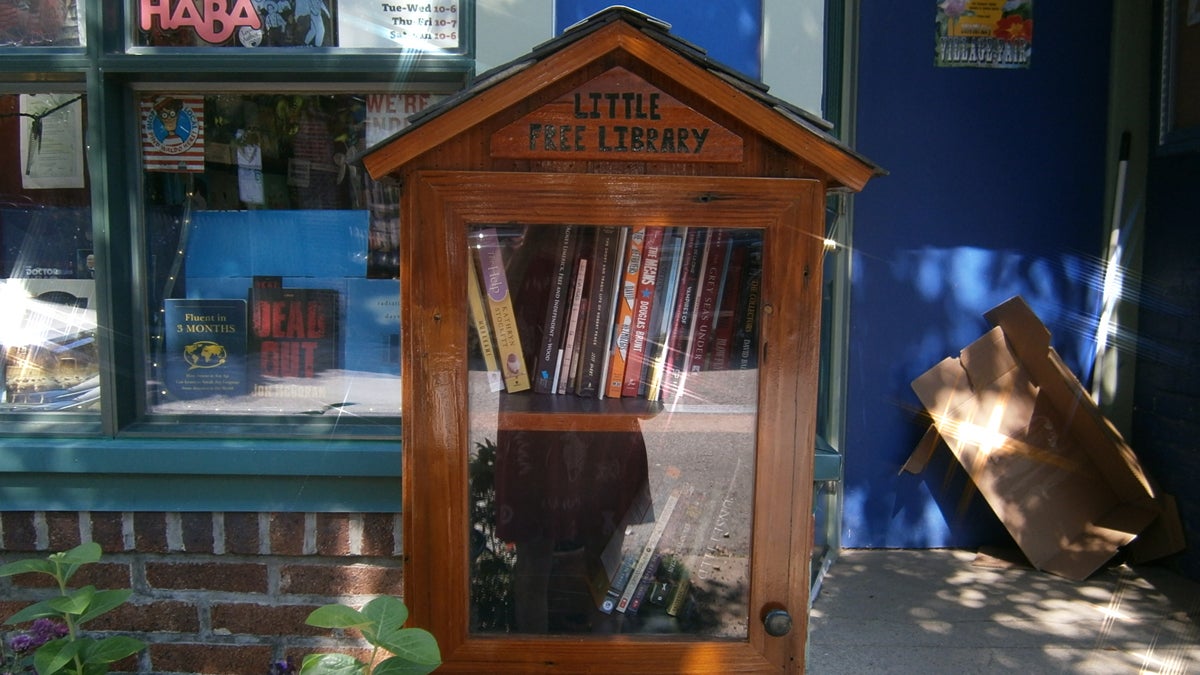A really free library and a lifelong love

(Image courtesy of Stacia Friedman)
My affection for libraries goes back to my childhood in Penn Wynne where a matronly lady behind the desk stamped my card with the date due. I loved the freedom of being able to choose whatever I wanted without concern for cost and without my parents’ permission.
There’s a new library in my Philadelphia neighborhood that is so small you could walk right by it. The size of a dollhouse at eye level, two feet wide and three feet high, this miniature library is outside of Big Blue Marble, an independent bookstore in Mt. Airy. A handwritten sign explains its purpose. “Please take a book and leave one behind.”
The top shelf is for adult books. The lower one, for children. Is it a gimmick, a publicity stunt or an act of random kindness? Probably, all of the above.
Love at first sight
My affection for libraries goes back to my childhood in Penn Wynne where a matronly lady behind the desk stamped my card with the date due. I loved the freedom of choosing whatever I wanted without concern for cost and without my parents’ permission. I wasn’t one of those precocious kids who read all of the Harvard Classics by the time they were in seventh grade. No, my tastes ran more towards Mary Poppins. The first “adult” book I read was Exodus, and I’m sure my 12-year-old brain couldn’t fathom the sexual implications, even though those were the parts I devoured.
Later, I would be charmed Narberth’s one-room library, awed by the Athenæum and dazzled by the sheer vastness of the main branch of the Free Library. No matter where I moved — New York City, Boston, Los Angeles — I patronized public libraries, which to me represented democracy at its finest. No job, no car, no money? No problem! Sit and use the computers. Do research. Write a résumé. Ask the reference librarian anything. Take as many books as you wish. Just remember to bring them back in time.
Ah, yes. Library fines. The embarrassment of being informed that your book or DVD is overdue … by six months! Almost every time I check out a book, I see peeved mothers digging into their purses while their guilty children sulk. But it’s not just the kids who manage to “lose” books. According to a librarian friend, adults not only come up with wild excuses but try to plea bargain for a reduced fee. Which brings me back to the concept of really free libraries such as the one outside the bookstore. You don’t ever have to return a book. Just leave one in its place. No one is watching. It’s barter at its best.
Reading railroad
Interestingly, I’ve seen this before. One day I walked into my SEPTA train station, and there it was — a small bookshelf with a handmade sign. “Take one.” The books were a mix of bestsellers, self-help, high-brow and low. I usually just grab a free tabloid for the commute into Center City. That day, I picked out a novel by a favorite author and felt just a bit fonder of SEPTA, an emotion that is all too rare, given my line’s propensity for packing people in like sardines, then stopping dead in the tracks for no apparent reason. (Yes, I know they are waiting for an AMTRAK train to pass, but still …)
While I doubt that SEPTA has officially launched a literacy campaign and instructed all of its station masters to offer free books to harried passengers, the concept has its appeal. Technology has made literacy obsolete. No one reads anything longer than a tweet. Books are on the cusp of extinction. If you have them in your home, they are either status symbols or nostalgic reminders of those halcyon days when you really could curl up with a book, before the kids, the mortgage and the 80-hour work week. What better time to put books in the hands of the public and not ask anything in return?
Scaling up
While I am enamored of small, pop-up libraries, I can’t wait to see what the Free Library on the Parkway does with its $25 million grant from the William Penn Foundation. The architectural renderings are impressive, but I hope the renovations don’t come at the expense of warmth and friendliness.
For those of us who recall the omnipresent Library pretzel man of the 1950s and ’60s, it would be fitting — in the new glistening, 8,000-square-foot lobby — to display a model of a vintage, wooden, pretzel cart tended by a mannequin (of dubious hygiene) in a ragged coat and cap. Visitors wouldn’t be intrigued by the man or the cart, as much as by the sign: “Pretzels — 10 cents.”
WHYY is your source for fact-based, in-depth journalism and information. As a nonprofit organization, we rely on financial support from readers like you. Please give today.

